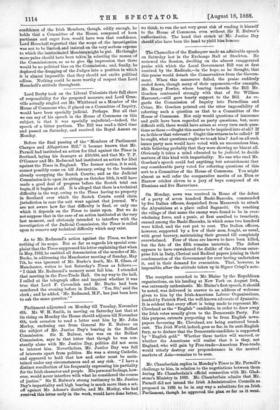The Chancellor of the Exchequer made an admirable speech on
Saturday last in the Exchange Hall at Stockton. He reviewed the Session, dwelling on the -almost exaggerated, praise with which the Local Government Bill was at first received by the Radicals,—in the hope, as he thought, that this praise would detach the Conservatives from the Govern- ment. When this manceuvre failed, the praise suddenly- cooled- down, though many of their opponents,—for example,. Mr. Henry Fowler, whose bearing towards the Bill Mr.. Goschen contrasted strongly with that of Sir William Harcourt,—still gave hearty support to the Bill. As re- gards the Commission of Inquiry into Parnellism and Crime, Mr. Goschen pointed out the utter impossibility of referring such a question as that to a Committee of the House of Commons. Not only would questions of innocence- and guilt have been regarded as party questions, but, more- difficult still, there would have arisen at every turn such ques- tions as these :—Onght this matter to be inquired into at all? If so, is this or that relevant? Ought this witness ta be called ? If he ought, what questions ought we to ask him? And on all suck issues party men would have voted with an unconscious bias„. while believing probably that they were showing no bias at all. Obviously it takes a mind educated to be judicial, to decide- matters of this kind with impartiality. No one who read Mr. Goschen's speech could feel anything but astonishment that any considerable party voted for referring questions of this sort to a Committee of the House of Commons. You might almost as well refer the comparative merits of an Eton or. Harrow cricket eleven to a jury of boys composed of sin Etonians and five Harrovians.


































 Previous page
Previous page